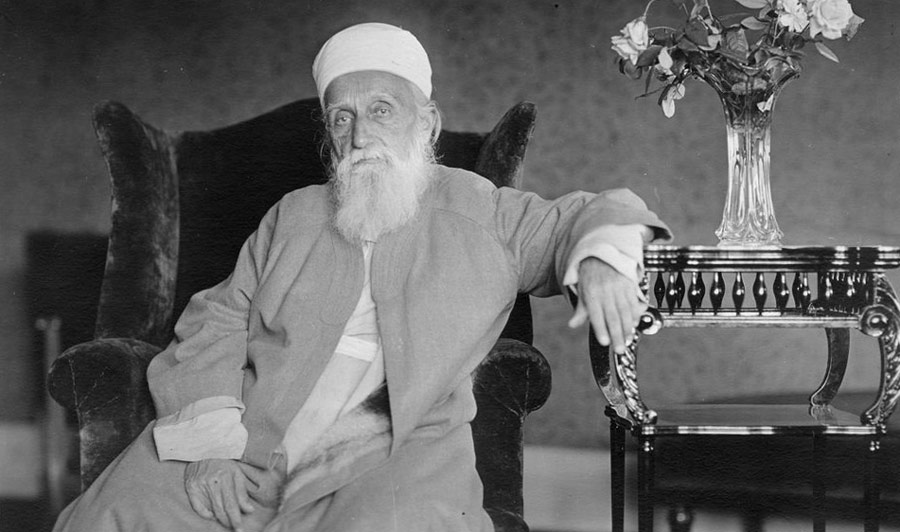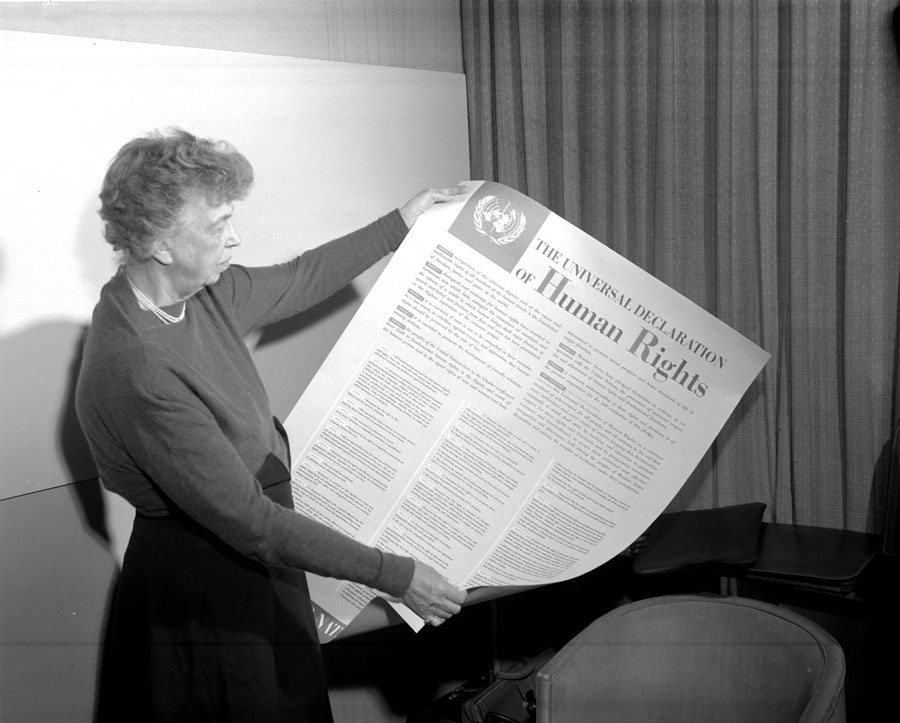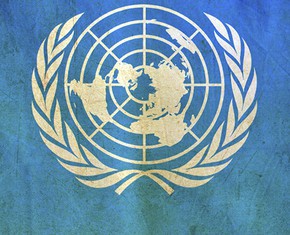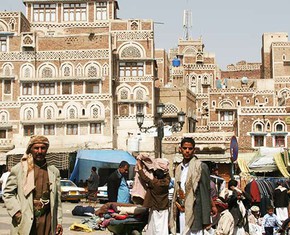The views expressed in our content reflect individual perspectives and do not represent the authoritative views of the Baha'i Faith.
On December 10, 1948—70 years ago today—the newly-chartered United Nations adopted “The Universal Declaration of Human Rights,” and an entirely new way of thinking began.
The UDHR simply and clearly asserted that every individual person has inalienable human rights:
“All human beings are born free and equal in dignity and rights. They are endowed with reason and conscience and should act towards one another in a spirit of brotherhood.”
That radical new global view of human rights broke fresh ground in the annals of the history of humanity. By recognizing the basic human rights of all people everywhere, it upheld the nobility and worth of every person, requiring its member states to enact and promote “universal respect for, and observance of, human rights and fundamental freedoms for all without distinction as to race, sex, language, or religion.” It set forth a “a common standard of achievement for all peoples and all nations.”
RELATED: How Baha’is Believe We Can Achieve World Unity
The UN’s remarkable and unprecedented international action brought into being one of the basic premises and principles of the Baha’i Faith. It fulfilled a primary goal of Baha’u’llah’s teachings, expressed here by his son Abdu’l-Baha in a 1912 speech given in Philadelphia:
“Baha’u’llah taught that an equal standard of human rights must be recognized and adopted. In the estimation of God all men are equal; there is no distinction or preferment for any soul in the dominion of His justice and equity.”

Abdu’l-Baha at the Rittenhouse Hotel in Philadelphia (June, 1912)
Why are human rights important?
Why, and how, did human rights become so important? What caused the world’s leaders, after World War II ended, to follow, whether knowingly or unknowingly, Baha’u’llah’s injunction to recognize and adopt a universal, equal standard of human rights?
The United Nations itself describes the main drivers of the process behind the UDHR this way:
“Although the world had made great progress in defining human rights, it was the events of the late 1930’s and early 1940’s that threatened humanity’s most firmly held convictions. By the end of World War II, six million Jews—of whom more than a million were children not yet in their teens—were killed in Nazi concentration camps, gas chambers and extermination centers. In the middle of the 20th century, at the hands of a technologically advanced, cultured nation-state, the idea of human rights was simply extinguished. In the beginning, the Nazi regime established discriminatory laws controlling who could own property, hold jobs, and go to school; in the end, they smashed dissent, launched a world war and enslaved and murdered millions of civilians.
“The results of the Nazi attempt to annihilate all the Jews of Europe and to enslave and destroy millions of others as well—Poles, gypsies, Soviet prisoners of war, homosexuals, the mentally and physically handicapped and political opponents—had shocked leaders and citizens throughout all cultures and societies of the post-war world. Winston Churchill called the Nazi atrocities a “crime without a name.” In the early 1940’s, a Polish lawyer named Raphael Lemkin coined the word “genocide.”
“The Holocaust altered forever the way in which people considered human rights. Prior to World War II the prevalent attitude had been that the protection of human rights was primarily a domestic concern, that is, a concern of sovereign governments. Efforts to defeat the Axis, however, became for many people synonymous with a struggle to make human rights a universal concern, that is, a concern of all human beings. The world united to defeat fascism and to secure human rights for everyone—everywhere. …
“After Germany’s unconditional surrender, further information of Nazi atrocities slowly became available. With these horrific revelations the determination to secure enduring respect for human rights became indelibly ingrained in the minds of all peoples.”
In 1947, after the defeat of Adolf Hitler and his Nazi regime, a select group of human rights experts from diverse legal, cultural and religious backgrounds came together to assemble and create a universal human rights document. Thanks to the diligent work of Eleanor Roosevelt—who led a drafting committee made up of John Peters Humphrey of Canada, Rene Cassín of France, Peng-chun Chang of the Republic of China, Charles Duke from the United Kingdom, Hernán Santa Cruz of Chile, William Hodgson of Australia, Alexander Bogomolov of the USSR and Charles Habib Malik of Lebanon—the group wrote the UDHR’s Preamble and its 30 articles by seeking guidance and input from people like Mahatma Gandhi. After two years of work, they concluded:
“Whereas disregard and contempt for human rights have resulted in barbarous acts which have outraged the conscience of mankind, and the advent of a world in which human beings shall enjoy freedom of speech and belief and freedom from fear and want has been proclaimed the highest aspiration of the common people ….”

Eleanor Roosevelt, chair of the UN Human Rights Commission, holds the historic document.
RELATED: 3 Big Reasons to Celebrate United Nations Day
The UDHR—which Eleanor Roosevelt successfully argued should be written as a Declaration rather than a Treaty—gradually became settled international law. Its powerful influence has spread to every corner of the Earth. It codifies the essential Baha’i message of the equality and oneness of the entire human race:
… the world of humanity is one race, the surface of the earth one place of residence and … these imaginary racial barriers and political boundaries are without right or foundation. Man is degraded in becoming the captive of his own illusions and suppositions. The earth is one earth, and the same atmosphere surrounds it. No difference or preference has been made by God for its human inhabitants; but man has laid the foundation of prejudice, hatred and discord with his fellowman by considering nationalities separate in importance and races different in rights and privileges.
Celebrating U.N. International Human Rights Day
Each December 10th, the world observes International Human Rights Day, also known as UN Human Rights Day, to commemorate the signing of the Universal Declaration of Human Rights. Human Rights Day is not only a signal achievement in human liberty and freedom, but a significant milestone, initially brought by the teachings of Baha’u’llah, in humanity’s release from tyranny and bondage. In a 1986 message to the American Baha’i community, the Universal House of Justice, the democratically-elected international administrative body of the Baha’i Faith, wrote:
“The spirit of liberty which in recent decades has swept over the planet with such tempestuous force is a manifestation of the vibrancy of the Revelation brought by Baha’u’llah. His own words confirm it. “The Ancient Beauty,” He wrote in a soul-stirring commentary on His sufferings, “hath consented to be bound with chains that mankind may be released from its bondage, and hath accepted to be made a prisoner within this most mighty Stronghold that the whole earth may attain unto true liberty.”
Might it not be reasonably concluded, then, that “true liberty” is His gift of love to the human race? Consider what Baha’u’llah has done: He revealed laws and principles to guide the free, He established an Order to channel the actions of the free, He proclaimed a Covenant to guarantee the unity of the free.
Thus, we hold to this ultimate perspective: Baha’u’llah came to set humanity free. His Revelation is, indeed, an invitation to freedom—freedom from want, freedom from war, freedom to unite, freedom to progress, freedom in peace and joy.”
















Comments
Sign in or create an account
Continue with Googleor